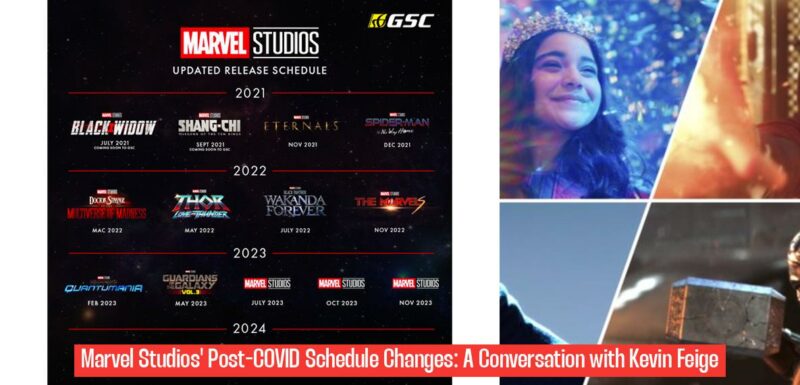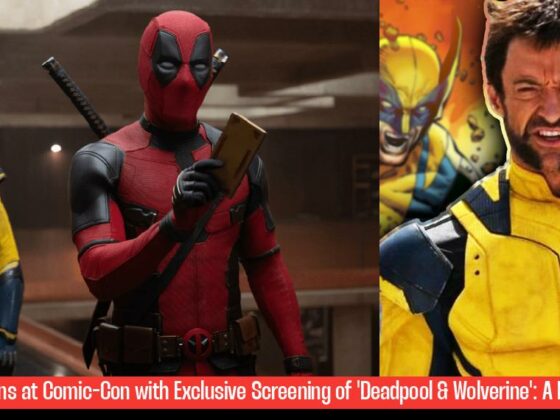Kevin Feige Talks Marvel Studios’ Post-COVID Schedule Changes
The head of Marvel Studios, Kevin Feige, recently shared his insights on how the COVID-19 pandemic impacted the Marvel Cinematic Universe (MCU) and altered the studio’s production schedule. While promoting the upcoming release of Deadpool and Wolverine, Feige reflected on the challenges and adjustments that the studio faced in the wake of the global health crisis.
In 2019, Marvel Studios was riding high on the success of Avengers: Endgame, the culmination of the Infinity Saga. The studio followed this triumph with Spider-Man: Far From Home, serving as an epilogue to the epic saga. However, the arrival of the COVID-19 pandemic brought production to a standstill, pushing back the release of any new Marvel films for nearly two years.
Feige acknowledged that the pandemic had a significant impact on the studio’s plans, leading to major disruptions in their meticulously crafted shared cinematic universe. In a candid interview with GameSpot, he stated, “I think you can go look at any big broad slate presentation we’ve done over the last 10 or 15 years and there have been changes–small and big–to them. Certainly, as you point out, these last few years have unquestionably been the most disruptive to all of us as citizens of Earth, but also to those of us trying to plot out a shared cinematic universe.”
One of the most notable effects of the pandemic was the reshuffling of Marvel’s release schedule. Spider-Man: No Way Home, initially slated to be released after Doctor Strange in the Multiverse of Madness, ended up hitting theaters first. This unexpected sequence of events highlights the fluidity and adaptability that the studio had to embrace in the face of unforeseen circumstances.
More updates: Reflecting on the Legacy of Richard Simmons and Dr. Ruth Westheimer in Palm Beach County
The pandemic also inadvertently narrowed the five-year gap that existed between the present and the near-future of the MCU, as established after the events of Endgame. Consequently, the precise timeline of present-day Marvel movies remains ambiguous, adding a layer of intrigue and speculation among fans.
Navigating the Pandemic: A Look at Marvel’s Adaptability
The COVID-19 pandemic presented unprecedented challenges for the entertainment industry, forcing studios to adapt their production strategies and release plans. Marvel Studios, known for its meticulously planned cinematic universe, was no exception. The pandemic disrupted the studio’s usual workflow, leading to delays in filming, post-production, and releases.
However, the studio’s leadership, under Feige’s guidance, demonstrated remarkable resilience and adaptability. They implemented new safety protocols on set, embraced virtual collaboration tools, and creatively navigated the constantly evolving landscape of the pandemic. This proactive approach enabled them to minimize disruptions and keep the MCU moving forward, albeit at a slower pace.
The pandemic also forced Marvel to reconsider its release strategy. While the studio had previously relied heavily on theatrical releases, the pandemic highlighted the growing importance of streaming platforms. Marvel responded by launching its own streaming service, Disney+, which gave them a new avenue to reach audiences and expand the MCU’s reach.
The success of Disney+ has solidified Marvel’s commitment to a multi-platform approach, ensuring that the MCU continues to thrive in the evolving media landscape. The studio has also actively explored new ways to engage fans, such as utilizing social media and virtual events to bridge the gap between releases.
The Future of the MCU: A Post-Pandemic Perspective
As the world begins to recover from the pandemic, Marvel Studios is looking ahead to the future of the MCU. The studio has a packed slate of upcoming films and television shows, showcasing the continued expansion of its cinematic universe. Feige has expressed optimism about the future, noting that the pandemic has only strengthened the studio’s commitment to storytelling.
In a post-pandemic world, Marvel is poised to embrace new creative opportunities. The studio is exploring new genres, expanding its character roster, and experimenting with different narrative structures. This bold approach suggests that the MCU is not only adapting to the changing world but also evolving in exciting and unexpected ways.
With the release of Deadpool and Wolverine, Marvel Studios is set to make a triumphant return to the big screen. The film marks the studio’s first foray into the R-rated superhero genre, further demonstrating its willingness to take risks and explore new territory. This bold move signals that the MCU is not afraid to push boundaries and experiment with different formats, ensuring that its storytelling remains fresh and engaging.
As Feige has stated, the pandemic has “unquestionably been the most disruptive” to the MCU’s plans, but the studio has emerged from this challenging period strengthened and more adaptable than ever. The MCU’s future looks bright, promising a myriad of exciting stories and characters to captivate audiences for years to come.
Embracing Change and Innovation: The MCU’s Enduring Appeal
The Marvel Cinematic Universe’s ability to adapt to changing circumstances is a testament to its enduring appeal. The studio has consistently demonstrated its willingness to embrace innovation and evolve its storytelling approach. This adaptability has allowed the MCU to remain relevant and engaging for audiences worldwide.
Throughout its history, the MCU has weathered various challenges, from changing cinematic trends to shifts in consumer preferences. The studio has consistently responded to these challenges with creative solutions, ensuring that the MCU remains at the forefront of popular entertainment.
The pandemic presented a unique set of obstacles for the MCU, but the studio’s response showcased its resilience and ability to thrive in the face of adversity. The studio’s commitment to innovation, coupled with its understanding of audience needs, has allowed it to navigate the pandemic effectively and emerge even stronger.
As the world continues to evolve, the MCU will undoubtedly face new challenges and opportunities. However, the studio’s history of adaptability and innovation suggests that it is well-equipped to navigate these challenges and continue to deliver compelling and engaging stories for generations to come.
How did the COVID-19 pandemic impact Marvel Studios’ production schedule?
The COVID-19 pandemic caused significant disruptions to Marvel Studios’ production schedule, leading to delays in the release of new Marvel films for nearly two years.
What was one of the notable effects of the pandemic on Marvel’s release schedule?
One notable effect was the reshuffling of Marvel’s release schedule, with Spider-Man: No Way Home being released before Doctor Strange in the Multiverse of Madness, contrary to the initial plan.
How did Kevin Feige describe the impact of the pandemic on Marvel’s shared cinematic universe?
Kevin Feige acknowledged that the pandemic had a significant impact on Marvel’s plans, causing major disruptions and necessitating adaptability in plotting out the shared cinematic universe.
What did the pandemic inadvertently do to the timeline of present-day Marvel movies?
The pandemic inadvertently narrowed the five-year gap between the present and the near-future of the MCU, established after the events of Endgame, leaving the precise timeline of present-day Marvel movies ambiguous and sparking speculation among fans.



